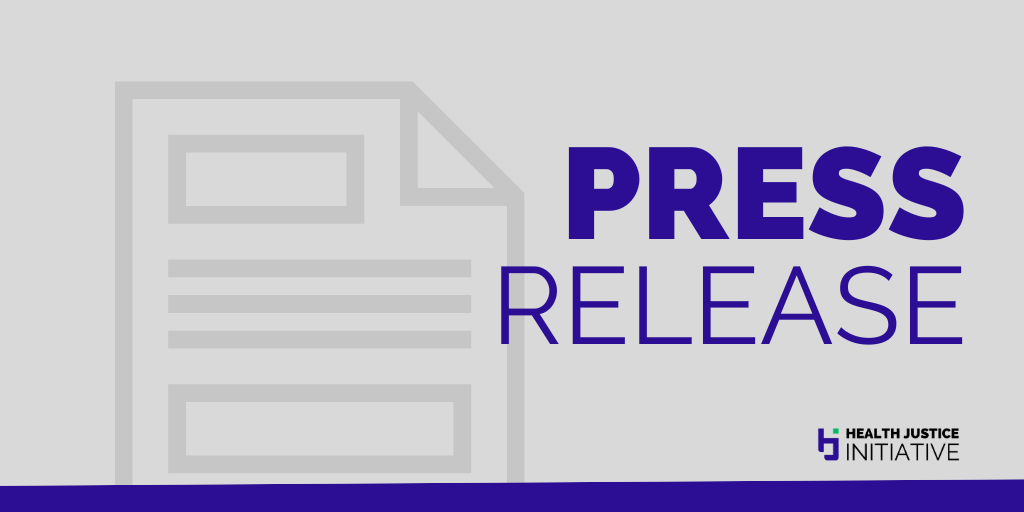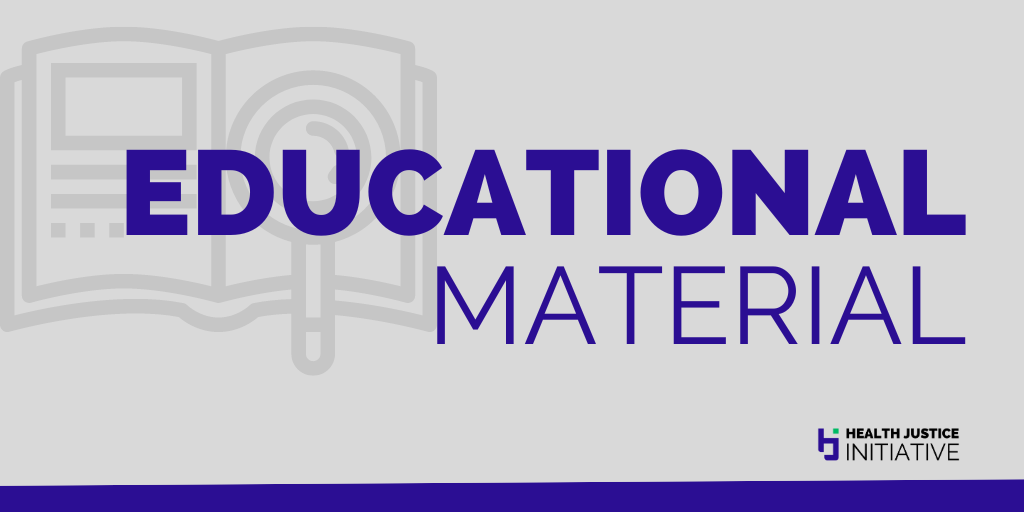Activist Coalition Demands Accelerated Access to Revolutionary HIV Prevention
Calls on Governments in the Global South to Break Trade and Intellectual Property Barriers and Take on Gilead’s Power
Countdown to access campaign launched on World AIDS Day
Johannesburg, South Africa – 2 December 2024: Today, a coalition of leading global health organizations launched an advocacy campaign to secure rapid, affordable access to groundbreaking long-acting HIV prevention technologies, with a focus on the Global South. This urgent call to action, supported by the Health Justice Initiative, Health GAP, Just Treatment, the Brazilian Interdisciplinary AIDS Association (ABIA), PLWHA, and civil society experts on access to medicines in India and beyond, arrives at a critical juncture in the fight against HIV. Each year, 1.3 million people are newly infected with HIV, and an AIDS-related death occurs every minute.
Long-acting injectable PrEP medicines, particularly lenacapavir (LEN-LA), have shown unprecedented effectiveness in preventing HIV infection. Recent clinical trials demonstrated that LEN-LA, administered twice yearly, is 100% effective in preventing HIV transmission among cisgender women and reduced the risk of HIV infection by 96% among gender diverse people and other populations at high risk of HIV infection. This revolutionary technology could transform HIV prevention, especially for marginalised communities who are not adequately served by current PrEP options that need to be taken daily. Despite the promise of this breakthrough for HIV prevention, the drug is priced at over $42,000 per year in the U.S., whereas generic versions could be produced for under or between $40-100.
FAQ: Gilead’s LENACAPAVIR (LEN-LA) license and implications for access
“This is not just another prevention tool – it’s a game-changer that could protect millions of people for whom current prevention options simply don’t work,” says Fatima Hassan, Director of the Health Justice Initiative (HJI) in South Africa, “But corporate greed, monopoly control and restrictive licenses are creating unnecessary barriers to local production and access to more affordable versions of lenacapavir, particularly in middle-income countries where HIV rates are rising. This is why we are calling on the South African government to take compulsory measures so that the drug can be widely manufactured in Africa, and everyone in the Global South has access.”
Forty-one per cent of new infections are in upper-middle-income countries. Yet, Gilead excluded many upper-middle-income countries with patent barriers from their voluntary licensing deal, blocking the potential for price-lowering generic competition creating a chilling effect on the scaling up of lenacapavir for HIV prevention and treatment.
“People across Latin America (Brazil, Argentina, Mexico, Peru) participated in Gilead’s clinical trials of lenacapavir, yet the corporation’s licensing scheme excludes our people at risk of HIV infection from accessing affordable generic versions for prevention. People have the human right to enjoy the benefits of scientific progress, but Gilead has undermined this right with its monopoly control,” said Veriano Terto Jr., Director of ABIA. “Brazil and other governments excluded by Gilead must take compulsory measures to overcome patent barriers to ensure local production and affordable access – it is morally and legally required now.”
The campaign aims to challenge pharmaceutical corporations’ (Gilead) restrictive pricing and licensing practices while advocating for measures to accelerate generic competition. It calls on governments in the Global South facing exclusion and high prices to urgently consider opening up supply through compulsory licensing to access affordable sources of lenacapavir. Gilead Sciences’ pricing strategy (approx. US$ 42k per patient, per year, for treatment) would make LEN-LA prohibitively expensive despite expert analysis several months ago showing it could be produced for as little as $40-100 per year. Recent indications are that it could be produced for even less than $40. Gilead’s earlier commitment to ‘non-profit’ pricing, has not, as yet, been followed through with a public declaration of the price that it / licensees will charge. When that price is announced or shared, it will require heightened global scrutiny and transparency.
“Everyone, everywhere who needs lenacapavir must get it as quickly as possible,” said Asia Russell, Executive Director of Health GAP. “Instead, Gilead’s greed is obstructing global access and will prolong this pandemic. Twenty-five years ago, we built a global movement that reduced HIV treatment costs by 99% and saved over 25 million lives. Now we must do it again with prevention technologies that could help end the HIV epidemic.”
The timing of the campaign is particularly significant as South Africa prepares to take over the G20 Presidency from Brazil and will hand it over to the USA in 2026. This leadership position provides a key platform to try to advance more ambitious policy priorities around access to medicines and global health equity, while the South African Presidency also calls on G20 Members to discuss systemic reforms of the World Trade Organisation (WTO).
Sibongile Tshabalala, Chairperson of the Treatment Action Campaign (TAC) emphasised the campaign’s grassroots focus: “This isn’t just about Gilead deciding which markets it will control – it’s about empowering communities most affected by HIV to demand their right to access these revolutionary prevention and treatment tools across developing countries. We refuse to accept a system where we cannot produce the medicines, we need in our health systems and people are excluded from life-saving scientific breakthroughs based on income classifications, and where people live. We demand an equitable system where all low and middle-income countries are able to take steps to provide the drug free of cost to people. Who gave Gilead the power to exclude Latin American and Asian countries, where the trials were done, from benefiting from generic competition now? As people living with HIV we have taken on Big Pharma before, we are ready to do it again.’’
The campaign launches against the backdrop of concerning global HIV statistics, with 1.3 million new HIV infections occurring annually. Notably, 55% of these infections affect key marginalised populations and their partners, with 80% now occurring outside sub-Saharan Africa.
“Our efforts to provide technical support to patent oppositions in India and elsewhere are part of a global effort to challenge Gilead’s monopoly on lenacapavir and open up generic supply from developing countries with manufacturing capacity, as well as where required for developing countries to issue compulsory licenses to overcome patent monopolies for the production or supply of generic lenacapavir, said Sangeeta Shashikant, Legal and Policy Advisor at Third World Network (TWN).
The campaign calls on all people living with HIV, HIV researchers, clinicians, health groups, activists, faith leaders, UN officials, and governments to demand Gilead immediately remove the chokehold of restrictions from its voluntary licenses, and instead issue multiple, non-exclusive and non-restrictive licenses across different regions to benefit all LMICs which include opening up generic manufacturing regionally and locally; and commit to one access price for all non-High Income Countries that is at least comparable to the cost of oral PrEP. The coalition also demands that Global South leaders including the governments of Brazil, South Africa and India renew the political will to act against pharmaceutical monopolies that are dictating the pace and scale of the global HIV response.
-ends-
MEDIA FACT SHEET: HIV Prevention
- Global HIV Prevention Context
- The global HIV epidemic continues to present significant challenges, with 1.3 million new HIV infections occurring annually. Key marginalised populations and their partners account for 55% of these new infections.[1] Outside of sub-Saharan Africa, key populations and their partners represent 80% of all new infections, indicating a crucial need for effective prevention strategies in these communities.[1]
- Current biomedical HIV prevention methods have shown limited effectiveness for key vulnerable populations. Traditional interventions such as condoms, oral pre-exposure prophylaxis (PrEP), and medical male circumcision have not adequately served sex workers, people who use drugs, adolescent girls, adult women, and LGBTQ+ individuals. This gap in prevention efficacy has created an urgent need for new approaches to better address these populations’ needs.[2]
- The current situation mirrors the critical juncture faced 25 years ago when global activism successfully challenged pharmaceutical profiteering, resulting in a 99% reduction in HIV treatment costs. This historical victory led to more than 25 million lives saved through increased access to generic ARVs.[3]
- Revolutionary Prevention Technologies
- Lenacapavir (LEN-LA)
Lenacapavir, a long acting HIV medicine requires only two injections per year, representing a revolutionary advancement in HIV prevention technology. The PURPOSE 1 trial demonstrated unprecedented success, achieving 100% efficacy among cisgender women. This was followed by the PURPOSE 2 trial, which showed a 96% reduction in HIV infection risk among a diverse population, including cisgender men, transgender men and women, and gender non-binary individuals.[4]To stop the tide of new infections, and protect people most at risk from HIV, including young women and people from marginalized communities, long-acting HIV medicines could be game changing – if all who would benefit can access it.The economics of LEN-LA present a stark contrast between potential and reality. While expert analysis demonstrates that the drug can be manufactured for between $40-100 per year[5],Gilead has set the U.S. price at $42,250 per patient annually (for treatment).The twice-yearly injection schedule significantly advances daily oral medications, potentially improving adherence and effectiveness in real-world settings.[6]
- Cabotegravir (CAB-LA)
Cabotegravir, approved in December 2021 for PrEP use, marked another significant advancement in HIV prevention. Clinical trials demonstrated superior efficacy compared to oral PrEP, offering a promising alternative for individuals struggling with daily medication regimens. However, ViiV Healthcare’s implementation of the drug’s rollout has been hindered by several factors: insufficient production volume to meet global demand,a voluntary licensing agreement that fails to address key access barriers, and binding middle-income countries and major procurers into non disclosure agreements undermining price transparency.[7] Four years later, there is no meaningful access.
- Access Barriers and Structural Challenges
- The path to widespread access faces multiple complex obstacles. Gilead has implemented an aggressive patent strategy across low—and middle-income countries (LMICs), filing patents on the drug, including ones extending its monopoly beyond 20 years. This strategy includes evergreening patents on formulations and salts, with five major patent applications pending in India alone.[8]
- The corporation’s voluntary license has drawn criticism for its restrictive nature. Many upper-middle-income countries experiencing rising HIV incidence rates are excluded from the licensing agreement. Non-diversion clauses do not allow supply outside of the 120 licensed territories, violation of which lead to strict liability, damages, and termination clauses, preventing licensed manufacturers from supplying to excluded countries, even if they issue compulsory licenses, which directly undermines TRIPS Flexibilities and the 2001 Doha Declaration on TRIPS and Public Health. Even in countries included in the licenses the licensing terms impose significant restrictions: Generic manufacturers under the license can supply generic Lenacapavir for PrEP and for “heavily treatment-experienced patients”. Restriction means a treatment provider must procure only for highly resistant cases even though people with HIV may require the drug for other indications. In addition, a generic licensee cannot co-package with other HIV medicines.[9]
- The lack of funding for upper-middle-income countries further complicates access. Countries excluded from licensing agreements face prohibitive pricing structures and do not receive funding from global health organisations, including PEPFAR, and the Global Fund to Fight AIDS, Tuberculosis and Malaria, and are already anticipating the need to ration access due to funding constraints. The lack of price transparency complicates negotiations for lower prices and hampers effective resource allocation[10]. Gilead may not include all Middle-Income Countries (MICs) from eligibility for its “non-profit or access price,” relegating communities in those countries to inferior prevention technologies. The worst affected countries will be many upper middle-come countries who are excluded from accessing affordable generic versions under the voluntary licensing, and from procuring at the non-profit or access price.
-ends-



